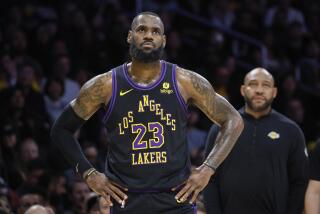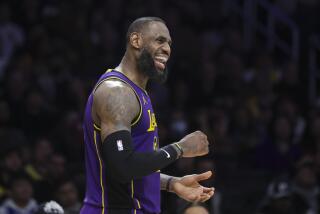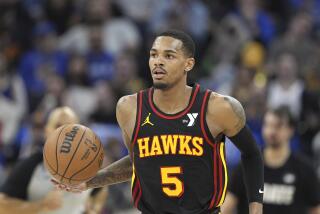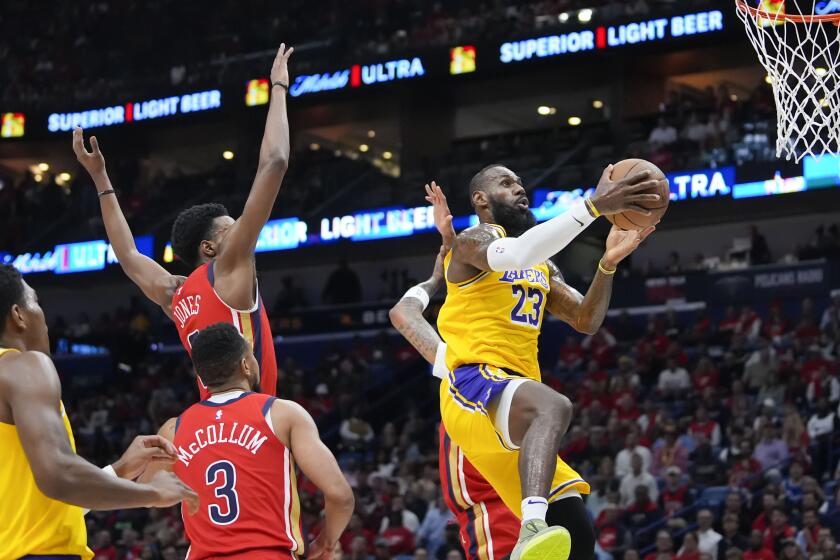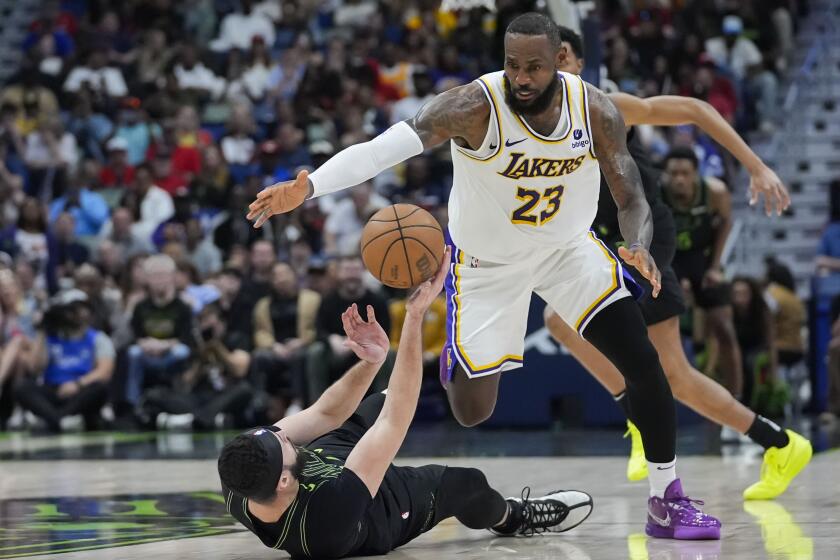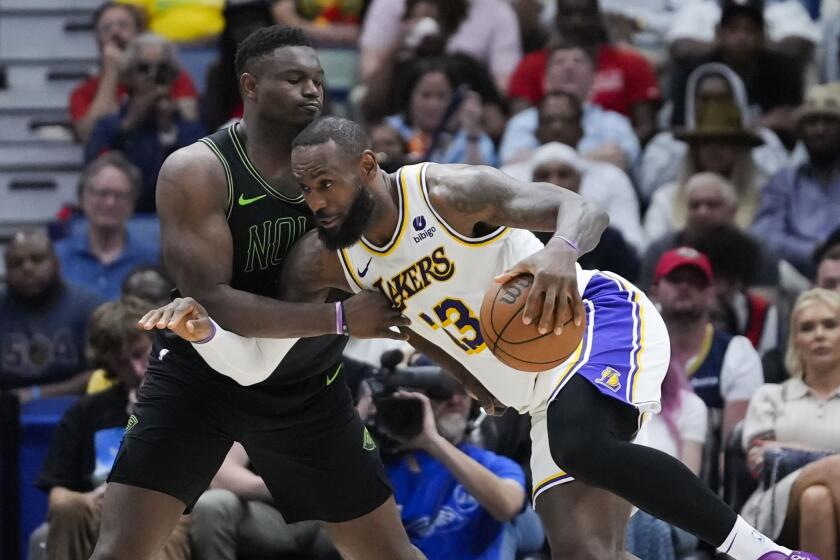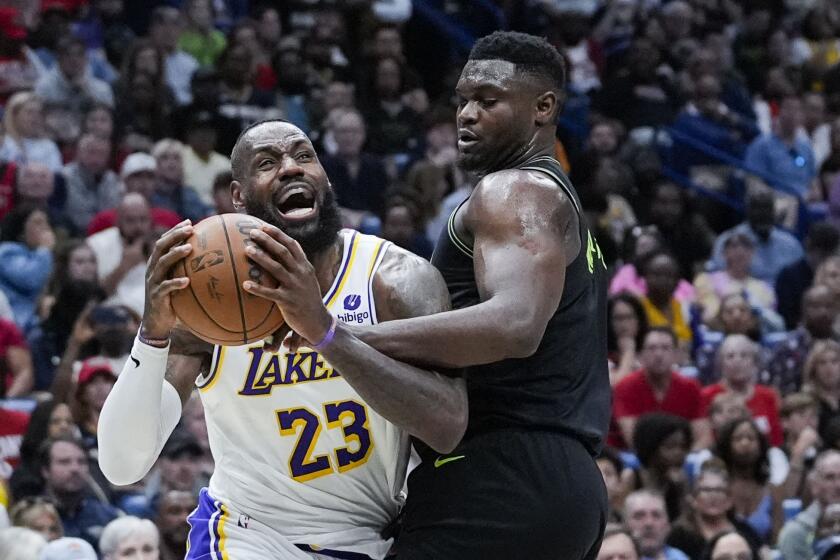Magic Johnson and Rob Pelinka say this isn’t a make-or-break offseason for Lakers
There will be no panic in the Lakers’ front office this summer, no urgency to force something to happen, no wasteful spending just for the sake of spending.
That message came from Lakers president of basketball operations Magic Johnson and general manager Rob Pelinka on Friday morning as they spoke together, addressing reporters one last time before truly diving into their offseason.
“I don’t look at July 2018 as the litmus test of success,” Pelinka said. “I think that there is a theme, a strategy, that you can see in history that is not going to be just defined by one moment. That will be the next point of time to see what happens, but there is a strong trend of success in our players and how the team is being managed that is going to continue going forward regardless of what specifically happens in July of 2018.”
Having been fined twice in the last seven months for tampering, Johnson cut short any true discussion of free agency, except to mention his excitement at the prospect of trying.
“I feel really good about Rob and I getting somebody in a room and talking to them about coming and playing for the Lakers,” Johnson said.
When Johnson and Pelinka took over the Lakers’ front office, they took over running a team with serious salary-cap constraints and without draft picks that could help alleviate some of that pain. The Lakers could have lost the second overall pick that became Lonzo Ball had it fallen out of the top three. Instead, they lost this year’s first-round pick and faced an offseason without the salary-cap space to take advantage of what’s expected to be a robust free-agent market that is likely to include LeBron James and Paul George.
One of Johnson’s and Pelinka’s first moves last summer was trading away Timofey Mozgov and his $16 million per year of salary-cap space, along with D’Angelo Russell, a player who had fallen out of favor but was one of the team’s better scorers.
There was more work to be done, but that gave them salary-cap space for one additional maximum contract.
Then the Lakers traded Jordan Clarkson and Larry Nance Jr., a shrewd move in which strictly the numbers were concerned, as Clarkson’s contract freed up $26 million over the next two seasons. But it was also a difficult move that made Pelinka a little nauseated, losing two players who’d grown up in the franchise, who worked to give the Lakers everything they asked of them.
That helped, but still more work remains. The Lakers would have to waive and stretch Luol Deng, who is making $18 million a year and has gritted his teeth through a season with virtually no playing time, and renounce their rights to Julius Randle to have the space to sign two free agents to maximum deals. If they could somehow trade Deng outright, alleviating the full amount of his salary, that would also help.
Further complicating matters for this summer is that Randle spent the season turning himself into an extremely valuable player for the Lakers.
“It’s obvious that yes I would love to have Julius back next year,” Lakers coach Luke Walton said. “There’s other factors that go into that, but from a coaching standpoint I would love to have Julius back.”
Johnson would not entertain a question about the tradability of his current young core players — rookies Ball, Kyle Kuzma and Josh Hart or second-year forward Brandon Ingram — should the right opportunity arise.
“We are not going to talk about that,” Johnson said before the question was completed. “We are not going to talk about that.”
One must also consider whether the free agents involved would want to join the Lakers. By all accounts, James will choose the destination that makes the most sense for him in basketball. George has wanted to join the Lakers, but could be swayed by a playoff run with Oklahoma City.
The Lakers have had similar plans in the past. When Jim Buss and Mitch Kupchak ran the team, they also saved salary-cap space intending to sign big-name free agents. But year after year, they couldn’t. Dwight Howard left. LaMarcus Aldridge wasn’t interested. Kevin Durant didn’t even accept a meeting. With the salary cap expected to spike, they signed Deng and Mozgov to contracts that were shocking not just for their high-dollar amount, but for their length. Most teams were not extending four-year offers.
Johnson didn’t compare his own plans to anything from the Lakers’ past, but offered one assurance.
“We are not going to give money away just to say we signed somebody,” Johnson said. “We are not going to do that.”
Follow Tania Ganguli on Twitter @taniaganguli
More to Read
All things Lakers, all the time.
Get all the Lakers news you need in Dan Woike's weekly newsletter.
You may occasionally receive promotional content from the Los Angeles Times.
